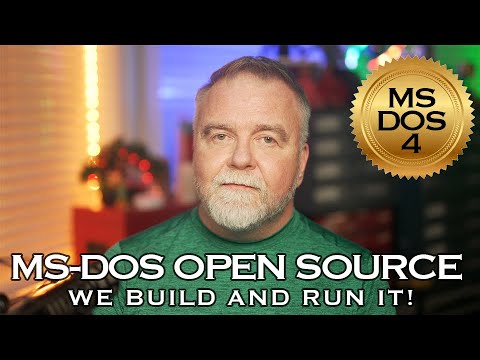I gotta be honest, I love his deadpan dry ass thumbnails.
His voice isn’t much different!
I watch his videos because it’s nice to have an insider view of what was the formative years of Microsoft’s
assimilationcreation of a common office workspace. The anecdotes are deliciously 90’s, the openness is refreshing, and the implementation detail is quite interesting.My other half likes the videos because he has that quite monotone voice, with quite an even canter and the odd lingering pause that can send her to sleep.
Win win.
Seems right on brand for him. He wrote a book about his life and struggles being on the spectrum. I wouldn’t be surprised if it’s not intentional at all.
Dollar-store Arnold says eat more cigars.
Microsoft loves open source!
Meanwhile FreeDOS being a drop in replacement for decades
What are the consequences of this
Like does this mean they could develop an app where you just have a library with all those nostalgic legacy games
DOS wasn’t a very complex OS and has already been reverse engineered more or less completely. Apps like DosBox already exist. It might cause a couple of minor revelations if/when the source is finally opened but I doubt it will have a big impact.
It might cause a couple of minor revelations if/when the source is finally opened
Isn’t the whole post about it being opened? It’s released: https://github.com/microsoft/MS-DOS
They trickle out versions over the years. This time they published version 4. The versions up to 6.22 (standalone) and
up to 97-8 (part of Windows 9x-ME) are yet to be published.Weren’t versions for 95/98 7.0 and then for ME 8.0?
You’re right. I’ll correct it.
https://en.wikipedia.org/wiki/MS-DOS#MS-DOS_7/8_(as_part_of_Windows_9x)
Very little. Older versions had already been open-sourced previously. This is specifically version 4.0, and the last version released was 8.0.
Technically correct, but 7 and 8 were part of Windows 9x.
The last standalone version was 6.22
I thought this was a specific, unpopular version. The versions people actually used are still closed. Did that change?
No, still the same.
4.0.x wasn’t great but it was used pretty heavily.
It’ll be slightly interesting to see it, and I’m not sure a more “popular” version like 5.0 would be much more interesting.
I’m curious about releasing 6.0 or 6.2, which MS was forced to recall because they “stole” some technology and put it in DOS. Although part thatd be interesting would be any damning code comments.
Wonder what the reason was for so much being in raw assembly when C existed. A basic library/API would be one of the first things I’d tackle in an OS. Move on to a higher level as soon as you’re able.
C compilers (at least on personal computers) weren’t great at optimization back then and every kilobyte mattered - the user only got 640 of them, going beyond that required jumping through hoops.
Similar for MHz, hand optimization was important for performance since there was so little CPU time to go around.And also legacy… If something is already written in assembly and you want to add a feature, you’re not going to completely rewrite it.
Compilers were much less complex back then and didn’t do a great deal of optimisation. Also hardware was slow, so your compiled code, which wasn’t necessarily optimal either before or after the compilation phase, was at least half as fast as you wanted it to be.
If you wanted speed, you hand-rolled assembly.
Not everyone knew C.
Lack of trust: what was it doing behind the scenes? What’s if it just went and … allocated memory all by itself!!
Optimization wasn’t so good back then. People believed that they could write better assembly. For speed and size.
Memory was tight. C would include big libraries even if only one function was needed. If “hello world” was several k in size, that added to the suspicion (even though that was a fixed overhead in practice).
People believed that they could write better assembly. For speed and size.
Now we know we can’t write better C.
Though my teacher in tech school a few years ago ran an entire OS, where everything is written in assembler. What was it?
Maybe Kolibri OS?
Its an amazing project, booting from a single floppy disk into a full graphical OS with multiple tools. And that on PCs with almost no RAM.
I sometimes use it to backup ancient PCs.
Yeah, sounds like this, thanks!
Makes me wonder why the suckless guys don’t hook in there.
Because Ryan wrote it like this 10 years ago and nobody bothered to rewrite it in C.
Back then, I’d guess most developers were relatively fluent in assembly, so if there’s only a small change to make, they’d just change the assembly and move on.
Everyone knew assembler back then. I did and I’m no developer today.
I…don’t think that’s true. Or the reason why.
Anyone doing, say, OS development, sure.
Yeah but 6.22 when
Here is an alternative Piped link(s):
https://piped.video/watch?v=BR6F0EdyulA
Piped is a privacy-respecting open-source alternative frontend to YouTube.
I’m open-source; check me out at GitHub.








